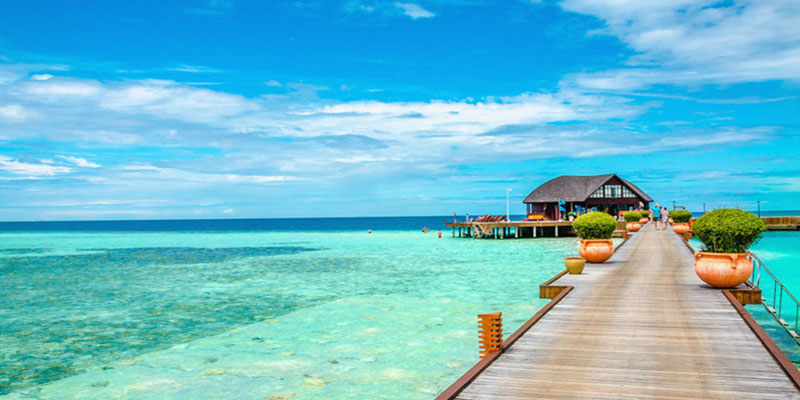While climate changes are expected to inundate many low-lying islands like the Maldives, tourism remains a top industry.
Researchers have developed an index to show how vulnerable island tourism industries are to climate change
The 38 small island developing states (SIDS) recognized by the United Nations, including Cuba, Jamaica, Haiti, and others, are highly vulnerable to climate change and exceptionally dependent on tourism, causing the islands to face an existential crisis. By 2200, climate change is expected to raise sea levels enough to inundate many low-lying islands like the Maldives. “The difference between 1.5 degrees and 2 degrees is a death sentence for the Maldives,” President Ibrahim Mohamed Solih recently told the U.N. General Assembly.
Tourism Vulnerability Index
A research team recently collaborated to develop a new Climate Change Vulnerability Index for Tourism (CVIT) which uses 27 indicators to analyze the vulnerability of tourism sectors to climate change. The team hopes the new tool will quantify the plight of the 181 tourism-dependent countries, including SIDS, that are most vulnerable.
The team found that the tourism sector was the most vulnerable in Africa, the Middle East, South Asia, and SIDS. It also found that vulnerability often was highest where tourism produces a high share of GDP and where tourism-sector growth projections are strong for the future. The team warned that a full spectrum of climate impacts was assailing tourism, including storms, floods, fires, and drought.
The increased pressure on freshwater supplies caused by the tourism industry also increases saltwater intrusion, which destroys crops and contaminates drinking water, but the SIDS are dependent on tourism and have little choice but to continue to promote tourism.
Technology can provide ways to manage climate risks. Fluence has many leading-edge solutions for islands and remote destinations to combat saltwater intrusion and provide fresh water to allow the tourist industry to flourish, even where conditions are becoming more difficult.
Fluence also offers Water Management Services to provide modern water infrastructure with no upfront investment through BOO and BOOT financing, as well as other traditional financing options. And the containerized packaging of our units offers distinct advantages for islands.
Addressing Water Vulnerabilities
The report mentions that small islands are suffering from water and food insecurity. With little water to irrigate agriculture, SIDS often have no choice but to import food at high cost. How can islands source irrigation water?
Fluence can address this need with both desalination solutions and wastewater treatment that produces water that can be reused for nonpotable applications. They’re scalable and flexible, and can be easily transported or moved as needs change.
Desalination: Islands are surrounded by limitless seawater for desalination. While desalination has long had a reputation for steep costs, the demand for water and its cost have gone up, and in the meantime, technological advances have brought desalination costs down, making even small-scale desalination viable in many cases. Fluence’s NIROBOX™ modular desalination plants utilize recent advances in reverse osmosis treatment for the lowest water price points on the smallest footprint.
Resorts World Bimini, for instance, desalinates enough water with its Fluence modular plant to serve the entire resort with enough left over to share with the rest of the island. And across the Caribbean in Costa Rica, a plant based on NIROBOX™ modular units produces enough desalinated water to make severe drought a nonissue for the Reserva Conchal luxury resort. The plant’s compact footprint provides fresh water without detracting from the resort’s natural ambience.
Wastewater Reuse: Fluence’s Aspiral™ units transform wastewater from communities, hotels, and resorts into safe, nonpotable water that meets the highest water-reuse standards in the world, including California Title 22 and China Class 1A.
Water treated with Aspiral™ can be used for agriculture and landscape irrigation as well as a number of other nonpotable applications, including cleaning, flushing toilets, and filling outdoor water features.
With further treatment, water from Aspiral™ can be used for managed aquifer recharge (MAR), which helps maintain groundwater supplies and helps prevent saline intrusion.
Flexible Solutions
Both Aspiral™ and NIROBOX™ units are permanently housed in standard steel shipping containers, so construction is minimal and shipping is simplified. The units are coated to stand up to salt air and rated for 150 mph winds.
Contact the experts at Fluence about your island’s tourism industry, and ask about our Water Management Services. We can build and operate a plant dedicated to your resort or community with no upfront investment and assume virtually all risk while you pay only for water.

